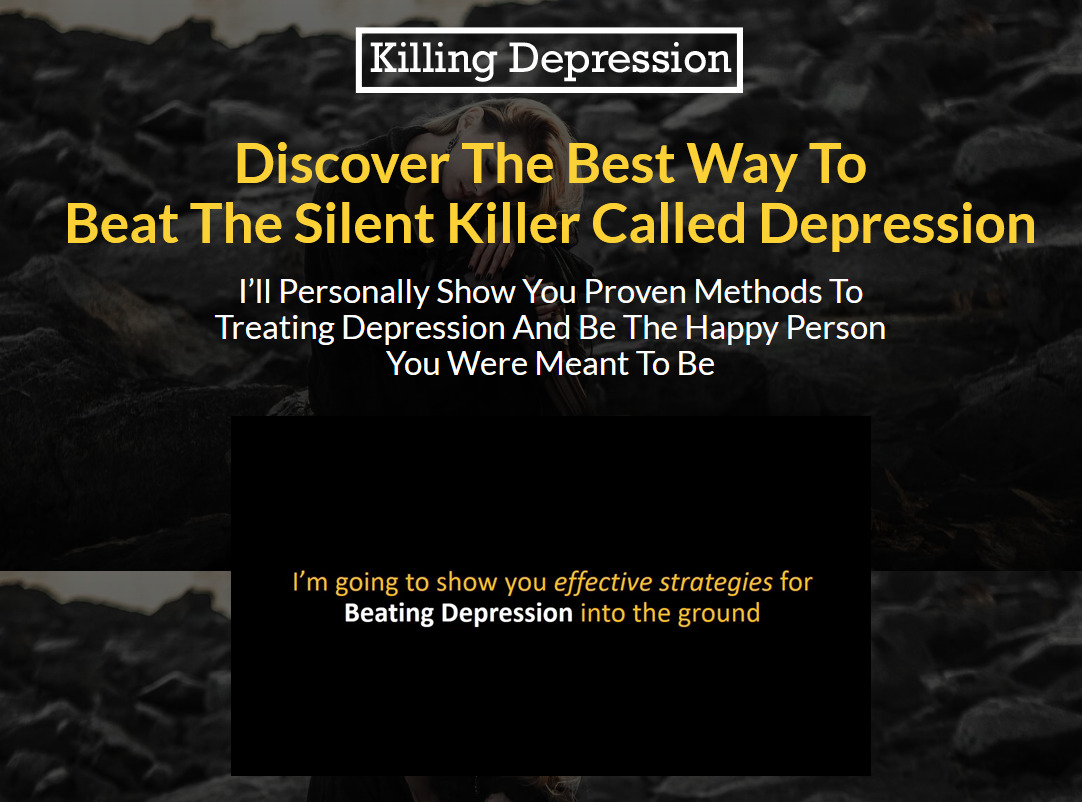Salespage Snapshot

Table of Contents
Introduction … 5
Chapter 1: Understanding Depression 9
What is Depression? … 9
Types of Depressions: .. 10
1. Persistent Depressive Disorder: . 10
2. Perinatal Depression … 17
3. Psychotic Depression .. 21
4. Seasonal Affective Disorder: .. 24
How different is depression from feeling down or sad? … 26
Chapter 2: Psychological and Physiological Effects of Depression..30
Physical effects of Depression .. 31
Psychological effects of Depression .. 36
Chapter 3: The Science and Statistics of Depression . 43
The Science of Depression 44
Statistics for Depression… 49
Chapter 4: 11 Myths About Depression .. 54
Chapter 5: Slay the Nightmare .. 62
1. Chester Bennington 63
2. Kurt Cobain . 64
3. Robin Williams … 64
Am I depressed? … 65
Chapter 6: How To Battle Your Worst Depression? .. 70
Practice caring for yourself … 71
Don’t shy away from treating yourself . 72
Pose a challenge to your low mood .. 72
Keep yourself active . 72
Set goals for yourself 73
Make a connection … 73
Look after yourself constantly .. 74
Conclusion 75
Sample Content Preview
These symptoms have now become a part of the individual’s day- to-day experience. These are emotions one is bound to express, particularly in the case of early onset – e.g., “I have always been this way.” When it comes to children and teens, the general mood to look out for will be ‘irritable’ instead of feeling depressed, and it usually lasts for at least a year.
Parents often fail to notice it or pay heed to it stating, “It’s a phase, it will pass.” This is one of the reasons they may not have seen – let alone reported – these symptoms to a doctor. It takes a keen eye to recognize these symptoms as symptoms and not the newly accepted teen way of life. However, there may be external influencers such as an individual who is constantly around you and notices the changes in you and probes you to receive help.
To meet the indicative criterion of dysthymic disorder, the symptoms could be a result of the direct or impending physiological effects of abuse of any substance (e.g., alcohol, drugs or medications) or even a common general medical condition (e.g., cancer or a stroke). These symptoms will also be the reason for significant distress or the impairment of social, educational or even occupational areas of day-to-day activities.
It is scary to think about how these symptoms are there right in front of us. They can be exhibited by potentially anyone; from the person you love the most to yourself. Being aware of these symptoms will help to identify the right moment to reach out for a skilled professional hand.
Talk to the doctor of your choice about your symptoms – preferably a doctor who knows your medical history or a doctor you are comfortable sharing your information with. You can also seek an appointment directly with a mental health provider; trust me, there is no shame in it. What you are doing is one of the bravest things you can do.
This fantastic decision will certainly change your life. If you are still disinclined towards seeking help directly from a mental health professional, reach out to someone else! Help can be sought out from someone who you think will be able to guide you in the right direction. The right direction, in this case, is certainly treatment; though, you could very well confide in a friend or a loved one, a teacher, a faith leader, a colleague or anyone you trust.
To identify and treat it, it’s important to understand what the causes could potentially be. However, it is important to know that the reasons can vary from individual to individual. Clinically, the precise cause for PDS is still not known.
Causes
Here are some of the commonly recorded causes:
Life Events
Just like every other form of depression, Persistent Depressive Disorder is highly likely to be due to traumatic incidents that have occurred in the recent or even the distant past. Events such as losing a loved one, continuous financial problems or even a high- stress demanding job or social environment can very easily trigger Persistent Depressive Disorder. Inherited Traits
The concept of inheritance is an amazing phenomenon. It has its flip side too; Persistent Depressive Disorder is one of those conditions that can be genetically passed on to any offspring. However, researchers are yet to isolate the gene that might be involved in causing and passing on depression. If you have close relatives who have suffered from depression, your doctor should be made aware of this.
The Chemistry in the Brain
The human brain is a repository of neurons and neurotransmitters that are naturally occurring brain chemicals. A chemical imbalance in the brain can play a significant role in triggering depression. According to recent research, the neuro- circuits are responsible for the stability of the moods and how they work. Depression indicates changes in the function of the neurotransmitters and it is this change that causes depression. This research was responsible for developing a way depression can be treated by targeting specific neuro-circuits.
Physical medical conditions
As much as depression is classified as a mental condition, there are physical illnesses that people suffer from that may also be the cause of the depression that is experienced. Physical brain trauma, a concussion is a good example, chronic physical illnesses like diabetes and heart disease can prove to be the causes of Persistent Depression Disorder in some cases.
2. Perinatal Depression
This type of depression is commonly seen in new mothers. Becoming a mother is considered as one of the biggest joys in the world. However, with this great joy comes a bundle of emotions, ranging from excitement to fear, to stress and even apprehension. The physical changes new mothers go through can vastly affect the mood and feelings.
Yes, it is common to experience mood swings but, in this case, Perinatal Depression is not just a ‘low mood.’ It is a serious condition, which doesn’t just affect the person suffering from Perinatal Depression, but also the people who are close to that person. It can hamper the relationships you share and cherish and also play a huge role in disrupting the healthy development of your child.
When it comes to new mothers, it becomes essential to know the difference between ‘baby blues’ and Perinatal Depression. Baby blues or mood swings a new mother experiences usually begin between the third day and the tenth-day post birth. You might feel a bit tearful at the most bizarre times or even overwhelmed by the simplest of things. This usually passes within a few days and without it being treated specifically. The only care that needs to be received during this phase is the support and understanding of the ones around you.
All parents go through a period when they take their time to adjust to the drastic new changes life has presented to them. The thing to remember here is that you are not the only parent who is trying to figure out how to calm a crying baby or just trying to get it to sleep. Every parent faces the same challenges. Certain parents take longer than others to adapt. It’s a learning process for the parents as much as it is for the kid. Perinatal Depression falls into the picture only when the mood swings persist and there is a feeling of being distressed, feeling down or sad and being overwhelmed most of the time. This can sometimes stretch over to two weeks or even longer in certain cases.
Other Details- 1 Ebook (PDF), 77 Pages
- 3 Graphics (PNG)
- 1 Salespage (HTML)
- Promotional Ad Material (Emails)
- Checklist, Mind Map, Landing Page, Lead Magnet, VSL
- Year Released/Circulated: 2017
- File Size: 30,728 KB
License Details:
[YES] Can be sold
[YES] Can be used for personal use
[YES] Can be packaged with other products
[YES] Can modify/change the sales letter
[YES] Can be added into paid membership websites
[YES] Can put your name on the sales letter
[YES] Can be offered as a bonus
[YES] Can be used to build a list
[YES] Can print/publish offline
[YES] Can convey and sell Personal Use Rights
[YES] Can convey and sell Resale Rights
[YES] Can convey and sell Master Resale Rights
[NO] Can modify/change the main product
[NO] Can modify/change the graphics and ecover
[NO] Can be given away for free
[NO] Can be added to free membership websites
[NO] Can convey and sell Private Label Rights














